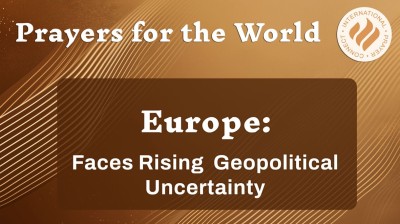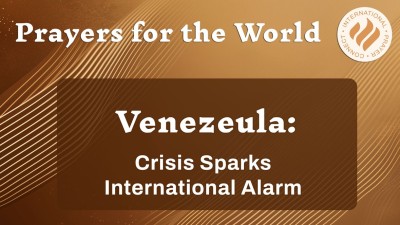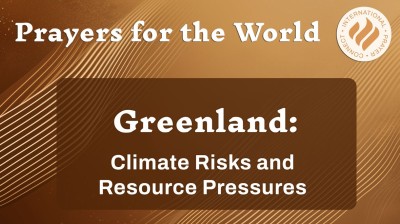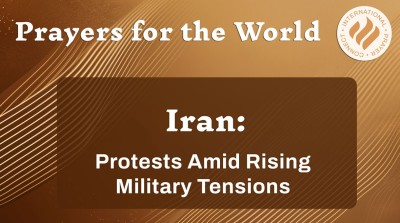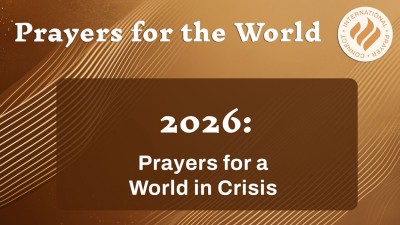Europe is entering 2026 under intensifying geopolitical strain as Russia’s war against Ukraine persists, transatlantic relations face renewed stress, and security, energy, and economic pressures converge. Russia’s continued aerial and missile attacks on Ukrainian cities and critical infrastructure, including devastating blows to energy systems in sub-zero winter conditions - have deepened humanitarian hardship and underlined the war’s brutality. The conflict’s toll has spurred emergency responses, such as the European Commission mobilising additional funds to support Ukraine’s energy needs and the ongoing search for durable peace solutions, though negotiations remain fragile. (Reuters)
European nations are also confronting broader strategic uncertainty. NATO leaders acknowledge that ending the war will require difficult decisions, even as Russia asserts that foreign forces in Ukraine would be deemed legitimate targets, complicating deterrence and defence planning. (Reuters)
Economic and energy risks persist alongside security challenges. Experts warn that threats below conventional thresholds, such as hybrid attacks on infrastructure, cyber threats, and strained relationships with key partners, could erode European stability over time. The European Union’s ban on Russian gas imports by late 2027 and coordinated efforts to diversify energy sources reflect a drive toward strategic autonomy, even as unity among member states is tested. (Wikipedia)
Amid these overlapping pressures - war, winter hardship, energy insecurity, defence debates, and economic strain - European unity and resolve are strained but remain critical. Leaders and citizens alike face extraordinary challenges that demand wisdom, resilience, and sustained cooperation in the face of uncertainty.
Prayer Pointers
1. Pray for Civilians in Ukraine and Across Europe
Pray for civilians bearing the daily cost of war - families displaced, homes darkened by power shortages, and communities bracing against cold and uncertainty. Ask God to be shelter for the exposed, strength for the weary, and comfort for those gripped by fear. Pray that help would arrive swiftly and tangibly through aid workers, local communities, and governments responding with urgency and compassion.
“The Lord is a refuge for the oppressed, a stronghold in times of trouble.” Psalm 9:9
2. Pray for Wisdom and Unity for European and NATO Leaders
Pray that European, NATO, and allied leaders would be filled with wisdom, restraint, unity, and courage as they navigate decisions with global consequences. Ask God to guide them away from fear-driven reactions toward thoughtful, collaborative choices that uphold peace and protect the vulnerable.
“If any of you lacks wisdom, let him ask God, who gives generously to all.” James 1:5
3. Pray That Peace and Diplomacy Prevail
Pray that doors for dialogue would remain open, even when trust feels fragile and tensions run high. Ask that faith, hope, and compassion prevail over mistrust, so that long-lasting peace, grounded in justice may emerge from conflict.
“Nation shall not lift up sword against nation, neither shall they learn war anymore.” Isaiah 2:4
Summary Prayer
God of refuge and truth, shelter those caught in the storm of conflict. Grant leaders’ discernment and unity, and lead nations away from fear toward reconciliation. Let compassion outshine hostility, and may Your peace, Lord, rooted in justice, take hold where war has worn the land thin. Amen.
More Information:
- Reuters – Europe faces geopolitical risks in 2026
https://www.reuters.com/world/europe/natos-rutte-says-reaching-deal-end-war-will-require-tough-choices-2026-02-03/ (Reuters) - AP News – Russian attacks on Ukraine’s power and civilian hardship
https://apnews.com/article/c10dbc6b621e196606fc79caab0eaad5 (apnews.com) - Reuters – EU bans Russian gas imports
https://en.wikipedia.org/wiki/European_Parliament_resolution_of_17_December_2025_on_phasing_out_Russian_natural_gas_imports (Wikipedia)
Venezuela remains in deep political and humanitarian crisis as the fallout from recent upheaval continues to reverberate across Latin America and beyond. In early January 2026, a U.S. military intervention captured former President Nicolás Maduro, triggering emergency meetings of the United Nations Security Council and Organization of American States amid regional alarm over sovereignty, security, and humanitarian impacts. The move drew broad international reactions, some supporting the end of Maduro’s authoritarian rule, others warning it violates international law and threatens stability in the region. (Wikipedia)
Humanitarian agencies report that nearly eight million Venezuelans currently need urgent aid as economic collapse, political repression, and insecurity persist. The refugee outflow - now among South America’s largest displacement crises, has seen millions seek refuge in neighbouring countries such as Colombia, Ecuador, Peru, and Brazil, straining host-community resources. (The United Nations Office at Geneva)
Within Venezuela, access to food, healthcare, clean water, and public services remains extremely limited. Funding shortfalls have left humanitarian operations severely under-resourced, while displaced families, children, and vulnerable groups are particularly at risk. (The United Nations in Türkiye)
Political developments continue to evolve: interim authorities have announced a sweeping amnesty and begun releasing hundreds of political prisoners, and there are efforts to reform parts of the justice and prison systems; however, long-term governance and democratic transition remain unclear and contested. (AP News)
The crisis highlights the urgent need for sustained humanitarian support, respect for human rights, and peaceful, multilateral pathways toward restoration and dignity for the Venezuelan people.
Prayer Pointers
1. Pray for Venezuelan Families in Hardship
Pray for families carrying the daily weight of scarcity. Empty shelves, fragile services, and futures clouded by uncertainty. Ask God to be near to parents choosing between necessities, to shield households from violence, and to provide daily bread in practical ways. Pray that neighbours, churches, and global partners would respond with open hands and steady compassion.
“The righteous care about justice for the poor, but the wicked have no such concern.” Proverbs 29:7
2. Pray for Wisdom and Restraint Among Leaders
Pray for those shaping decisions about Venezuela’s path forward, both within the nation and beyond its borders. Ask God to form leaders marked by humility, integrity, and restraint. Leaders who protect life rather than exploit power. Pray that diplomacy would be guided by truth, and that peace would not be pursued at the expense of justice.
“Peacemakers who sow in peace reap a harvest of righteousness.” James 3:18
3. Pray for Healing and Restoration
Pray for the slow, necessary work of healing within families, communities, and institutions worn down by years of strain. Ask God to mend what has been fractured, to rebuild trust where it has been lost. Pray that the people of Venezuela would glimpse renewal again: dignity restored, hope reborn, and peace taking root in their land.
“The Lord upholds all who fall and lifts up all who are bowed down.” Psalm 145:14
Summary Prayer
God of mercy, see those weighed down by hardship and breathe strength into weary hearts. Guide leaders toward humility and restraint, heal what has been broken, and restore dignity to the people of Venezuela. Let justice rise, let compassion endure, and let Your peace take hold where suffering has lingered too long. Amen.
More Information:
- UNHCR on Venezuela’s humanitarian situation
https://www.unhcr.org/uk/emergencies/venezuela-situation (unhcr.org) - UN analysis of ongoing aid and political context
https://turkiye.un.org/en/308083-venezuela-crisis-un-aid-effort-continues-amid-political-upheaval (The United Nations in Türkiye) - Wikipedia on international reactions to the 2026 U.S. intervention
https://en.wikipedia.org/wiki/International_reactions_to_the_2026_United_States_intervention_in_Venezuela (Wikipedia)
As the conflict between Ukraine and Russia approaches its fifth year, the war continues to impose catastrophic human and infrastructure costs across Ukraine. Russian drone and missile attacks have persisted, targeting residential areas, energy grids, and civilian infrastructure, causing deaths, injuries, and widespread blackouts — especially in eastern and southern regions. Most recently, several attacks resulted in multiple civilian deaths, including strikes in Odesa and Kharkiv, highlighting that violence still falls heavily on non-combatants.
Healthcare and humanitarian systems remain under extreme strain. The World Health Organization has launched a 2026 emergency appeal, seeking tens of millions of dollars to protect access to essential health services for hundreds of thousands of people despite continual attacks on hospitals and clinics. Nearly 3,000 verified assaults on medical facilities since 2022 have weakened care and heightened vulnerability among displaced families.
Diplomatic efforts continue but remain fragile. Trilateral peace negotiations involving the United States, Ukraine, and Russia took place in Abu Dhabi earlier this year in an attempt to break the deadlock, though key territorial disputes and security guarantees remain unresolved. These talks yielded the release of hundreds of prisoners but no ceasefire agreement, and Western sanctions packages against Russian energy and financial networks have expanded.
Meanwhile, both sides are reshaping military strategies amid grinding frontline stalemates. Casualty figures remain high, with heavy losses reported on both sides as positional warfare and attrition continue to characterise the conflict.
The human cost persists: millions remain internally displaced, energy shortages are widespread during winter, and children’s education and healthcare access continue to be disrupted. This prolonged war presses deeply on families and communities across Ukraine.
Prayer Pointers
1. Pray for Ukrainian Civilians and Vulnerable People
Pray for protection, comfort, and provision for Ukrainian civilians enduring continued attacks, displacement, and hardship. Ask God to guard families, especially the elderly, children, and those without shelter or basic services, and to fortify aid delivery in the face of violence and winter weather.
“God is our refuge and strength, an ever-present help in trouble.” — Psalm 46:1
2. Pray for Peace, Wisdom, and Restraint
Pray that global leaders, mediators, and negotiators would be filled with wisdom, restraint, and courage to pursue peace rather than escalation. Ask God to open hearts to reconciliation, strengthen diplomatic efforts, and dismantle pride and fear that fuel conflict and delay peace.
“Blessed are the peacemakers, for they shall be called children of God.” — Matthew 5:9
3. Pray for Healing of Minds and Bodies
Pray for physical healing, mental resilience, and emotional restoration for those wounded, traumatised, or living in fear. Ask God to comfort the grieving, strengthen healthcare workers, and provide resources to care for the sick, displaced, and those suffering from loss.
“He heals the brokenhearted and binds up their wounds.” — Psalm 147:3
Father God, be shelter and strength for Ukraine’s people. Guard the innocent, guide peacemakers, and bring healing to broken lives. Turn hearts toward peace, uphold mercy over vengeance, and let justice and hope rise above the gloom of war. Amen.
More Information
* WHO Humanitarian Appeal for Ukraine 2026
https://www.who.int/europe/news/item/06-02-2026-ukraine–who-seeks-us-42-million-in-2026-to-protect-health-care-as-war-enters-fifth-year 
* Al Jazeera – Key developments in the Russia-Ukraine war
https://www.aljazeera.com/news/2026/2/8/russia-ukraine-war-list-of-key-events-day-1445 
* Peace Negotiations in the Russo-Ukrainian War
https://en.wikipedia.org/wiki/Peace_negotiations_in_the_Russo-Ukrainian_war_%282022%E2%80%93present%29 
[1:15 pm, 9/2/2026] Andy Page: Page 3 - Shine! In Intro letter… Please remove apostrophe from it’s - so just ‘its’
We will be praying for the vision of 2BC, for children and youth across Indonesia and for the success of the Light of the World movie and it’s
Gospel vision.
Sudan’s civil war - now marking over 1,000 days of relentless conflict between the Sudanese Armed Forces (SAF) and the Rapid Support Forces (RSF) has plunged the nation into one of the world’s most acute humanitarian crises. Millions of civilians have been killed, displaced, or driven into life-threatening hunger amid grinding warfare across multiple fronts. Recent reports from the United Nations and humanitarian organisations describe Sudan as the site of the largest displacement and hunger crisis on Earth.
The collapse of public services including health care, clean water, and food systems, has compounded suffering. The World Food Programme warns that more than 21 million people now face acute hunger, with confirmed famine in regions such as Darfur and Kordofan, and the risk of famine spreading further where access remains blocked by insecurity. Funding shortfalls have placed lifesaving aid at risk of running dry unless urgent contributions are made.
Civilians, especially women and children, endure frequent attacks, siege conditions, and widespread abuses, including sexual violence and violations of international humanitarian law. Aid delivery continues to be dangerous and inconsistent due to blocked roads, collapsed infrastructure, and shifting battle lines. The International Rescue Committee reports that humanitarian funding has collapsed by nearly half, even as needs escalate.
Displacement is staggering: millions are internally uprooted while others seek refuge in neighbouring countries such as Chad, South Sudan, and Egypt, overwhelming fragile border communities. The crisis is a stark testament to the human cost of unending warfare, marked by hunger, disease, and relentless insecurity.
Prayer Pointers
1. Pray for Protection of Civilians
Pray for women, children, and families caught in the crossfire, whose paths are uncertain. Ask God to be their stronghold and shield, to guard them from bombardment, abuse, and displacement. Pray for His supernatural presence to encircle refugee camps and frontline communities, and that hearts everywhere would rise in compassion to meet their urgent needs.
“God is our refuge and strength, an ever-present help in trouble.” Psalm 46:1
2. Pray for Humanitarian Access and Provision
Pray that life-saving aid - food, clean water, medicine, and shelter would reach those who hunger and thirst for relief. Ask God to open safe passages for aid workers, replenish dwindling resources, and stir a global wave of generosity that sustains Sudan’s people even in the face of insecurity, blocked routes, and scarce funding.
“He satisfies the thirsty and fills the hungry with good things.” Psalm 107:9
3. Pray for Peace, Justice, and Wise Leadership
Pray that leaders, mediators, and international partners would pursue peace with integrity, wisdom, and mercy. Ask God to expose injustice, soften hardened hearts. Pray that ceasefires hold, negotiations bear fruit, and every choice honours the dignity of human life above politics or pride.
“Blessed are the peacemakers, for they shall be called children of God.” Matthew 5:9
Summary Prayer
Lord of compassion and justice, shelter Sudan’s innocent and provide for those in desperate need. Strengthen those who serve faithfully, guide leaders with wisdom, and move the world to act courageously, mercifully, and with enduring care. Amen.
More Information:
- UN Office for the Coordination of Humanitarian Affairs – Sudan
https://www.unocha.org/sudan (unocha.org) - World Food Programme – Sudan Emergency
https://www.wfp.org/emergencies/sudan-emergency (wfp.org)
• UNICEF & OCHA – 1,000 days of war briefing
https://www.who.int/news/item/09-01-2026-sudan-1000-days-of-war-deepen-the-world-s-worst-health-and-humanitarian-crisis (who.int)
Iran is facing a convergence of severe internal and external pressures as economic collapse, political repression, and escalating regional tensions unfold simultaneously. Inside the country, inflation remains extremely high, the national currency has continued to lose value, and the cost of food, fuel, and housing has placed unbearable strain on ordinary families. Sanctions, economic mismanagement, and reduced oil revenues have left millions facing insecurity and hardship.
Public protests, often led by young people and women, have re-emerged across multiple cities, driven by unemployment, corruption, and restrictions on personal freedoms. Human rights organisations report mass arrests, intimidation, internet shutdowns, and the use of force to suppress dissent. Communication blackouts and surveillance have further isolated communities and obscured the scale of unrest.
At the same time, regional instability has intensified. The United States has repositioned a naval battle group into the region, placing significant military assets within striking distance of Iran amid heightened rhetoric and warnings. Officials describe the move as a deterrent, yet analysts caution that such deployments increase the risk of miscalculation, escalation, or unintended confrontation particularly while Iran is already under profound internal strain.
For civilians, the combination of economic collapse, repression, and the threat of military conflict deepens fear and uncertainty. Any escalation would likely worsen humanitarian suffering, disrupt vital infrastructure, and further isolate the population. Yet even amid pressure and fear, many Iranians continue searching for truth, hope, and meaning. Underground Christian communities persist quietly, often at great personal cost.
Scripture reminds us that God is near to the crushed in spirit and hears the cries of the oppressed, even when nations tremble.
Prayer Pointers
1. Pray for Protection of Civilians Amid Unrest and Tension
Pray for families living under economic strain, fear, and uncertainty. Ask God to be their refuge and strength, providing daily needs and sustaining hope. Pray that courage and perseverance rise in hearts, for those quietly seeking truth and justice.
“The Lord hears the needy and does not despise his captive people.” Psalm 69:33
2. Pray for the Right to Peaceful Expression
Pray for Iranians peacefully voicing their hopes and frustrations, seeking justice and accountability. Ask God to safeguard demonstrations, move hearts toward restraint, and inspire leaders to listen with humility. Pray for safe advocacy, respect for human dignity, and that change comes through peaceful, righteous means.
“Blessed are the peacemakers, for they shall be called children of God.” Matthew 5:9
3. Pray for Spiritual Awakening and Courage
Pray for spiritual awakening across Iran, that hearts would encounter Christ’s truth, peace, and freedom amid hardship. Ask God to strengthen underground believers, protect prayer networks, and awaken courage, hope, and faith where fear and repression seek to silence truth.
“You will know the truth, and the truth will set you free.” John 8:32
Summary Prayer
God of justice and mercy, watch over the people of Iran. Protect the vulnerable, sustain peaceful change, and guide leaders with humility and wisdom. Let freedom, truth, and compassion shine, and may Your purposes of peace and hope prevail over fear, oppression, and despair. Amen.
More Information:
- IMF – Iran country economic overview
https://www.imf.org/en/Countries/IRN - Human Rights Watch – Iran protests and crackdown
https://www.hrw.org/middle-east/north-africa/iran - UN OHCHR – Human rights situation in Iran
https://www.ohchr.org/en/countries/iran
As 2026 unfolds, the world faces a convergence of humanitarian, geopolitical, and economic crises that are stretching societies, governments, and aid systems to their limits. According to the United Nations, well over 300 million people now require urgent humanitarian assistance, the highest level ever recorded - driven by conflict, climate-related disasters, displacement, and economic breakdown.
Armed violence continues to fuel hunger and mass displacement in multiple regions, including Sudan, Gaza, Yemen, eastern Democratic Republic of the Congo, Haiti, and parts of the Sahel. The World Food Programme warns that conflict remains the primary driver of acute food insecurity, with supply routes disrupted, farmland abandoned, and aid access increasingly restricted. Millions of children are at risk of severe malnutrition, with long-term consequences for entire generations.
At the same time, global instability is rising. Strategic analysts and conflict-monitoring organisations warn that unresolved flashpoints, militarisation, and hardened rhetoric between regional and global powers heighten the risk of escalation through miscalculation. Economic pressures intensify these dangers. The World Bank reports growing debt distress, persistent inflation, and widening inequality, hitting the poorest communities hardest and undermining fragile states.
Climate shocks, floods, droughts, heatwaves, and storms further compound vulnerability, particularly in countries least equipped to respond. Together, these overlapping crises reveal the fragility of human systems and the deep interconnectedness of global suffering.
Scripture reminds us that creation groans under the weight of brokenness, yet God remains sovereign over nations and history. This moment calls the Church to watch and pray. Not only for relief, but for repentance, justice, restraint, and the mercy of God to break into a wounded world.
Prayer Pointers
1. Pray for Civilians in Conflict and Crisis
Pray for men, women, and children caught in the chaos of war, disaster, and humanitarian emergencies. Ask God to protect, provide, and sustain hope where suffering feels unending. Pray especially for the vulnerable, the young, the elderly, and those uprooted. That they would know God as a refuge and strength in every storm.
“God is our refuge and strength, an ever-present help in trouble.” Psalm 46:1
2. Pray for Provision Amid Hunger and Displacement
Pray that food, clean water, shelter, and aid would reach nations facing hunger and mass displacement despite insecurity, funding gaps, and political barriers. Ask God to open safe pathways for relief workers, strengthen those who serve in dangerous conditions, and stir generosity in governments, churches, and meet urgent needs with compassion and consistency.
“He satisfies the thirsty and fills the hungry with good things.” Psalm 107:9
3. Pray for Wisdom and Humility Among Global Leaders
Pray that global leaders would walk in humility, restraint, and clarity as tensions rise and decisions ripple across nations. Ask God to guard hearts against pride, fear, and aggression, guiding leaders toward diplomacy. Pray that courage would take the form of mercy, foresight, and protection of human life.
“Pride goes before destruction, a haughty spirit before a fall.” Proverbs 16:18
Summary Prayer
Father God, be our refuge in a wounded world. Feed the hungry, shelter the displaced, and protect the innocent. Break the pride that fuels conflict, grant leaders’ humility and wisdom, and let Your justice, mercy, and peace shine brighter than fear and despair. Amen.
More Information:
- UN Global Humanitarian Overview
https://www.unocha.org/global-humanitarian-overview - World Food Programme – Global Hunger Crisis
https://www.wfp.org/global-hunger-crisis - Council on Foreign Relations – Global Conflict Tracker
https://www.cfr.org/global-conflict-tracker
We invite you to join millions of believers from churches and Christian ministries around the globe, as we unite for 24-hours of prayer for Buddhist Peoples.
This will be an opportunity to pray together, exalting Jesus Christ as King throughout the Buddhist world, asking the Lord of the Harvest to send forth laborers to every unreached Buddhist people group!
We have produced a Prayer Guide that is available in multiple languages online HERE
We are encouraging everyone to pray where they are - at home, at church, at cell groups, at work or in houses of prayer! Pray solo, in couples, as families, and devote some time in worship and prayer, upholding Buddhist peoples in 7 key cities and regions of the world.
 Our Global Family 24-7 Prayer community will be praying with us across the 24 hours.
Our Global Family 24-7 Prayer community will be praying with us across the 24 hours.
Register to join Global Family 24-7 online HERE
Jason’s friend, Jon Shabaglian, leader of Psalmist Mission has written an awesome anthem for the Day of Prayer entitled ‘Tsunami’. This inspirational worship song will be launched on the Global Day of Prayer!
Let's be praying for Kingdom breakthrough across these key Asian cities, the USA and the wider Buddhist diaspora!
This will be the first of our 5 worldwide days of prayer for 2026! – Watch this Intro Video!
The ‘Until the Light Breaks Through’ 7-Day Prayer Guide for Buddhist Peoples is designed to help individuals, families, prayer groups, and churches engage meaningfully in prayer for Buddhist peoples in the week leading up to the Global Day of Prayer for Buddhist Peoples on 17 February 2026.
It offers both biblical depth and practical structure, making it easy to use whether you have five minutes or an extended time set aside for intercession.
The guide is arranged as a day-by-day journey, covering seven locations and themes across Asia and the global Buddhist diaspora.
Each day focuses on a real place, real people, and a real story, helping prayers move beyond statistics to compassion-filled, informed intercession.
The journey includes Bhutan, Laos, Thailand, Japan, Northeast India, Myanmar, and the Buddhist diaspora in Los Angeles, with links to 110 Cities and Prayercast resources to encourage continued prayer throughout the year .
Each daily section follows a consistent and easy-to-navigate format:
- A short context-setting story or testimony showing how God is at work among Buddhist peoples
- Key prayer points focused on discipleship, family life, compassion, breakthrough, and Gospel access
- Selected Bible passages to anchor prayer firmly in Scripture
- A brief personal application question, inviting reflection and obedience
- A highlighted city focus, connecting local stories to God’s wider mission in the world
This structure allows the guide to be used flexibly. It works well for personal daily devotion, family prayer times, small groups, or corporate prayer gatherings. Some may choose to pray through one section each day, while others may use the stories and prayer points as a framework for longer worship-based prayer sessions.
The guide also intentionally prepares hearts for the Global Day of Prayer, helping intercessors build faith, understanding, and spiritual momentum. Rather than focusing on religious systems, it highlights Jesus’ love, compassion, power, and sufficiency, calling believers to pray with hope and confidence.
Ultimately, this guide is an invitation to stand with God’s heart for Buddhist peoples—believing that as the Church prays, the light of Christ will continue to break through homes, families, cities, and nations.
‘Until the Light Breaks Through’ has been published in 30+ languages (online), and is available for free, from the 110 Cities website.
 The IPC Media Team have published a companion Childrens Guide entitled Listen - Live – Love that includes songs, daily stories and ‘Justin’s Thoughts’ written by Justin Gunawan.
The IPC Media Team have published a companion Childrens Guide entitled Listen - Live – Love that includes songs, daily stories and ‘Justin’s Thoughts’ written by Justin Gunawan.
This colourful Children’s Prayer Guide for Buddhist Peoples invites children aged 6–12 on a seven-day prayer journey around the world, meeting real-life children and families living in Buddhist cultures.
Each day focuses on a different place—such as Bhutan, Laos, Thailand, Japan, India, Myanmar, and the Buddhist diaspora—using engaging stories, simple explanations, prayer points, Bible verses, and fun language activities.
Children learn what daily life is like, what people believe, and why knowing Jesus matters.
Families can use the guide together at breakfast, bedtime, or family prayer time—reading a story, learning a new word, praying short prayers, and asking God to show His love to others.
It works brilliantly for family devotions, children’s groups, or individual reading, helping children grow in compassion, faith, and confidence to pray big prayers together for the Buddhist world.
Read and download Listen – Live – Love in multiple languages HERE
